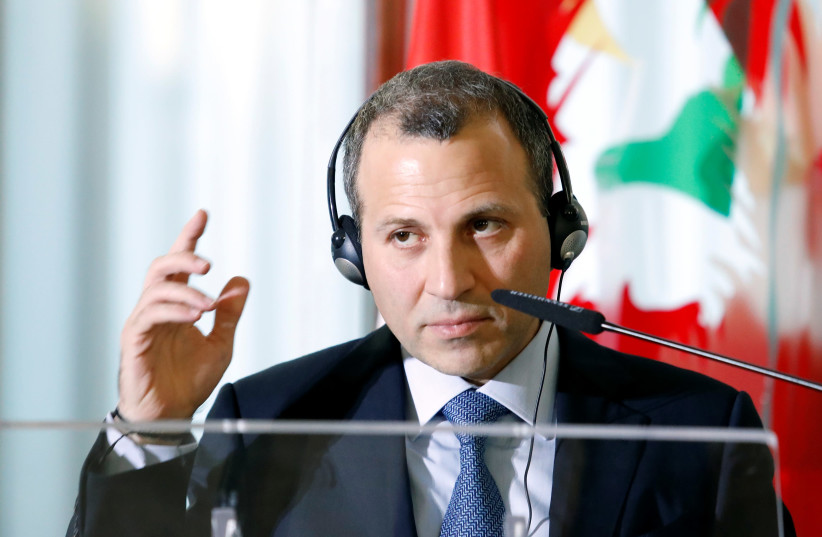A judge investigating the 2020 Beirut port explosion resumed his work this week in a surprise that may cast a shadow over key figures in Lebanon. Lebanese Judge Tarek Bitar has been slammed by Hezbollah in the past and his work interrupted since December, 2021.
The news of the continued work by the judge comes as Lebanon continues to function without a sitting president; the politicians in Beirut voted recently for the 11th time and couldn’t come up with a new leader. This leaves the country divided and in a power vacuum.
That vacuum is usually filled by Hezbollah, whose goal is to have a leaderless, bankrupt Lebanon, so that it can feed off the remains of the country, hollow it out and fill it with weapons to threaten Israel.
Hezbollah benefits from chaos in Beirut
Hezbollah has a kind of stranglehold on power in Lebanon – not because it is that large of a party, but because it has key allies and enough power to block the opposition from doing anything. Because it benefits from chaos, it is interested in a political impasse.
Gebran Bassil, head of the Christian party the Free Patriotic Movement, has been an ally. Lebanon’s politics are sectarian by law, so almost every party has sectarian-ethnic-religious roots, whether Christian Maronites or Shi’ite Hezbollah or Sunnis, Druze, etc. Bassil is also related to outgoing president Michel Aoun.

Aoun was behind the alliance between his Christian party and Hezbollah. Last year, Bassil slammed the US and Israel, accusing them of being behind a conspiracy that supposedly affected the Lebanese parliamentary elections.
This is the usual Iranian talking point: Blame the Americans and Israel for everything. It is used to distract attention from the severe problems that Iran has brought to countries in the region.
Iran's interest in Lebanon's politics
Today, Iran is very interested in Lebanon’s politics. An article at Tasnim news in Iran, a pro-government publication, examines the recent controversies in Lebanon, considering how interim Prime Minister Najib Mikati and Bassil are taking differing positions. Iran seems to be concerned that Bassil may be breaking with Hezbollah.
“Hezbollah, which has been trying to keep the situation calm since some disagreements with the Free Patriotic Movement were reported in the media, had to react to Bassil’s words by issuing a statement saying: ‘We do not want to have any relationship become a dispute with any of our friends,’” Tasnim reported. The terrorist group appears to be threatening the Christian leader.
Hezbollah has also demanded the government not hold any meetings without a “consensus.” This means that it doesn’t want its allies in the government to hold any meetings unless it dictates the agenda.
According to the report, Bassil is annoyed with the lack of progress among the other political leaders in the country and that he objects to the influence of the Amal movement, a Shi’ite political grouping. The report adds that Hezbollah deputy Hussein Khalil met with Bassil. “The two sides discussed the issue of electing the president and the positive and negative points of the Mar Mikhail agreement,” the report reads. The agreement refers to a memorandum in 2006 between Aoun and Hezbollah.
HEZBOLLAH LEADER Hassan Nasrallah has said that he is committed to the agreement. Tasnim noted that “the noteworthy point is that both Hezbollah and the National Free Movement were interested in media coverage of this meeting in order to end the rumors about the severing of relations between these two parties in some circles.”
L’Orient Today reported on January 4 that “in addition to showing openness to a broader political compromise around the presidential election, Hezbollah wanted to send a message to an ally who has been giving it a hard time: Free Patriotic Movement leader Gebran Bassil, who categorically refuses to endorse [Joseph] Aoun, and is also opposed to the election of Marada leader Sleiman Frangieh, Hezbollah’s preferred candidate.”
The Tasnim article notes that there are only two realistic candidates for president; Frangieh and Aoun. Frangieh is the son of Tony Frangieh, who was assassinated in 1978 during the Lebanese civil war; and he is the grandson of political leader and President Suleiman Frangieh. He is also related to Samir Frangieh. Joseph Aoun is the commander of the Lebanese army.
Iran hopes that Hezbollah and the Free Patriotic Movement leadership can come to some kind of understanding despite the impasse. Meanwhile, other lawmakers in Lebanon are demanding that the vote for the president continue and that the lawmakers not continue to walk away from their responsibility. But no one seems to be able to agree on how to go forward.
As the crisis continues, Hezbollah continues to entrench. It continues to build watchtowers and fortifications in southern Lebanon and to threaten Israel, which is carrying out large-scale military drills with US Central Command this week. Hezbollah knows that it must tread carefully – and benefits from the vacuum of power at the heart of Beirut.
